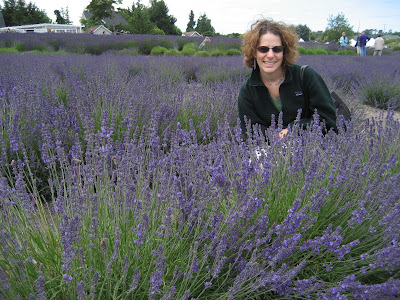So, yesterday I managed a feat never before reached by even the most dedicated of Fulbrighters.
I got myself locked into the archives.
First, I have a bone to pick with the staff of the archives. You'd THINK that the level of security would be rather high in a building that houses Belgium's precious papers, some of the only surviving bits of its past after so much of it has been ravaged by war after war. And you'd THINK the staff, the very same staff that asks you to jump through (albeit small) hoops in order to even view the documents, would at least have a quick glance around the building before locking the doors for the evening. That perhaps they would consider that a couple of American girls are still in the bathroom, 2 minutes before closing, never even thinking that they might get locked in.
When we came out (I had bumped into a friend Z, a fellow Fulbrighter also studying music) all the lights were out, the doors were locked, AND a security fence had been pulled in front of the door to prevent even the most determined burglar from getting in. Never mind the fact that Z and I could easily have gone down into the basement and set fire to all of Belgium's precious archives. Perhaps we should have considered at least knocking a few boxes off the walls to protest the injustice of it all.
And this may have not been such a big deal, but mind you, this was 30 minutes before we had to attend a reception at the Home of the US Ambassador. 30 minutes before we had to arrive at the invitation-only, we-may-have-to-call-out-the-guard-if-you-neglect-to-come reception that the US government generously hosts in honor of responsible, would-never-get-themselves-locked-into-the-archives Fulbrighters.
*sigh*
Long story short (too late!) we happened upon a maintenance worker who showed us the secret, underground passage out of the archives and back into Brussels. We even arrived EARLY at the reception, though it took me a good 30 minutes and three glasses of water before I stopped sweating profusely. BUT I suppose we can just chalk this up to another unforgettable experience. My next challenge is to find a way to fit this adventure into my dissertation. Perhaps in a footnote . . .
29 November 2006
27 November 2006
Thanksgiving in Belgium
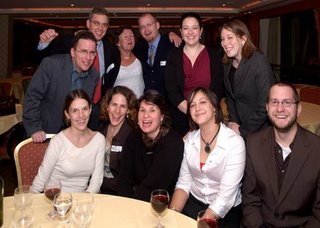
If I have never mentioned how good the food is here in Belgium, let me do so now. Belgium holds few distinctions among its more popular neighbors in Western Europe. And what does make it unique--the EU, the beer, the linguistic divide--remains a source of pride for even the most humble Belgian. And as Belgium draws more tourists and businesspeople to its cities every year, so the restaurants have battled to bring this little country out ahead of its great rival in all things gourmet: France. Even the shabbiest looking brasseries in Belgian cities serve up their meals with great attention to taste and presentation. So it should come as no surprise that our Fulbright Commission pulled out all the stops for that greatest of American gastronomical events: Thanksgiving!
Every year the American Club of Brussels hosts an annual Thanksgiving dinner at the Sheraton on the Place Rogier. And every year our fabulous Fulbright director makes sure that all Fulbrighters are invited as guests of the Commission. Our dinner dutifully contained many traditional dishes--turkey, sweet potatoes, mashed potatoes, green beans--but, in a distinctly European twist, we also had fine aperitifs and a pairing of wines (red and white and NEITHER of them French!) The stuffing was our director's personal recipe, a wonderful combination of bread, nuts, raisins, and other dried fruits. The meal began with New England Clam Chowder, not nearly as good as you find in New England, but a reasonable substitute all the same. And the bread--well, both my stomach and my pocketbook decided long ago that I could live quite happily off of Belgium's beautiful artisanal bread, which is everywhere you go cheap and plentiful!
Every year the American Club of Brussels hosts an annual Thanksgiving dinner at the Sheraton on the Place Rogier. And every year our fabulous Fulbright director makes sure that all Fulbrighters are invited as guests of the Commission. Our dinner dutifully contained many traditional dishes--turkey, sweet potatoes, mashed potatoes, green beans--but, in a distinctly European twist, we also had fine aperitifs and a pairing of wines (red and white and NEITHER of them French!) The stuffing was our director's personal recipe, a wonderful combination of bread, nuts, raisins, and other dried fruits. The meal began with New England Clam Chowder, not nearly as good as you find in New England, but a reasonable substitute all the same. And the bread--well, both my stomach and my pocketbook decided long ago that I could live quite happily off of Belgium's beautiful artisanal bread, which is everywhere you go cheap and plentiful!
So, it was all mostly wonderful. I did have friends, self-proclaimed turkeys experts, who insisted that the turkeys were in fact just overgrown chickens, and the mincemeat pie was about 80 times too sweet for even me. Of course, no one headed the pleas of M, a Wisconsin native, to wheel out a TV so we could watch a little football. And at the end of the night I missed all the express trains back to Leuven and had to suffer through the local "stop and start" train, generally staffed by drivers who haven't quite learned to gently pop the clutch when pulling out of the station. But it was, in all, a nice little slice of home!
25 November 2006
Cracking into the Archives
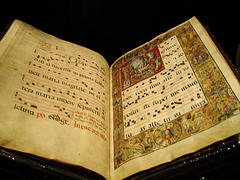 After nearly one hundred pages of secondary research, a bibliography of almost 150 sources, an outline, and at least a vague idea of what my actual thesis topic is, I am ready to hit the archives. This means that, rather than read what other people have to say about primary sources, I get to actually put my hands on the documents themselves! I have this romantic notion that I will immediately be able to decipher the ancient forms of language, and, perhaps on my second (or third) day stumble upon that hitherto-undiscovered piece of information that will not only unlock the secret to all things Peter Philips but may also secure me a spot in musicological history.
After nearly one hundred pages of secondary research, a bibliography of almost 150 sources, an outline, and at least a vague idea of what my actual thesis topic is, I am ready to hit the archives. This means that, rather than read what other people have to say about primary sources, I get to actually put my hands on the documents themselves! I have this romantic notion that I will immediately be able to decipher the ancient forms of language, and, perhaps on my second (or third) day stumble upon that hitherto-undiscovered piece of information that will not only unlock the secret to all things Peter Philips but may also secure me a spot in musicological history. Walking into the Algemeen Rijksarchief (the Belgian State Archives) and beginning a search through old documents requires only the ability to find the buidling from the Central Train Station in Brussels, fill out a little form, have your picture taken for the ID card, and pay 10 euros. No need for the passport, letters of invitation, proof of residency, and every other bit of information I have learned to carry with me when embarking on new events. Once you have your card in hand you can settle in amongst other eager students pouring over books, maps, papers, and all sorts of other interesting documents. You look up your documents in a catalogue, walk over to the computer, type in the requested information, and--voila!--30 minutes later your documents arrive via an ancient little elevator lift from the basement where the mysterious archival "elves" scurry around, selecting your requested box from among thousands of other dusty little boxes and sending it on its way to your eager little hands. I have images of these workers being a little like the creatures that work in Gringott's bank in J.K. Rowling's Diagon Alley. Perhaps I will never know...
For me the first task was determining exactly what set of documents I needed to examine. Archival research can be a little like a fishing expedition, and the key is to LOOK like you know what you're doing, even if you aren't exactly sure. The catalogues themselves range from detailed accounts of documents to vague descriptions--"Various papers belonging to the Royal Court, 1396-1743"--and that sort of thing. Unfortunately my own research covers such a wide swath of topics ranging from music to liturgy that I could really take a stab at looking just about anywhere. I am also hampered by the fact that many documents from my time period, 1598 to 1628, have gone missing or have been destroyed for one reason or another. So on my first day I thought I would start with something relatively simple: correspondence between Brussels and Rome in the early seventeenth century.
Well, five hours later I didn't manage to stumble across that jaw-dropping piece of information, but I did manage to learn a lot about old books (very moldy), old handwriting (nearly illegible), and courtly diplomacy (for example, when one writes to the Pope, one begins with a VERY lengthy and suitably humble introductory phrase that in itself should take up at least half the page.) My plan at the moment is to spend at least two days a week in the archives, fishing around for various little bits of information that can help support my thesis. Wish me luck!
18 November 2006
Where have all the Flemings gone?: A Sarcastic Commentary on Klara's Top 75
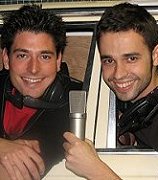
(Note the distinctly musicologist-y title above. Too much research ...)
Even in these darkening days of late autumn I look forward to waking up in the morning. I have a kind of routine that gets me started on the right foot: I roll out of bed, put on the kettle for a cup of instant coffee, get the computer going for a look at the New Yorks Times or NPR online, and flip on the radio for a listen to what is rapidly becoming my favorite classical music radio station. There are actually two popular classical music stations in Belgium, one Flemish (Klara) and one French (Music 3). Maybe it's the inner Fleming in me, but I prefer Klara. Klara has the best evening jazz program (complete with smokey-voiced radio announcer sounding quite cool in Dutch), the best news reports (I think), the least amount of annoying announcements, and, of course, the best selection of early music which can be heard often throughout the day rather than relegated to early Sunday mornings as it might generally be in the States.
So imagine my surprise when I flip on the radio at 8:00 AM and hear Puccini's "Nessun Dorma" wailing forth from my little boombox. No one would argue that is it a beautiful piece of music, but not quite so early in the morning. I turn the radio off, patiently go about my routine and wait it out, hoping for a little Willaert or Monteverdi to clear the air. I flip the radio back on to hear some wild and bizarre jazzy symphonic thingy. What the ... ?
Today is the airing of the "Top 75 Classical Pieces" on Klara (www.klara.be). Ok, now it's all becoming clear. Puccini, yes of course. And the jazz thingy? The Jazzsuite
Alas, it is not to be. This "Top 75" list is saturated with the usual suspects: Bach, Beethoven, Chopin, Mozart, Brahms, Haydn, etc. There are some nice surprises--more Monteverdi than I would have thought, the Psalmen Davids by Schutz, and something called Vlaamse Dansen by one Jan Blockx--but only a smattering of early music that includes Josquin's Stabat Mater and Tallis's Spem in alium. Not to mention an almost non-existant showing of American composers, Gershwin and Barber being the sole contributors. And, please, I must say (strictly for the benefit of Z): Vivaldi's Gloria??
My Flemish friends would probably say that this is Klara's attempt to glamourize the classical music industry. Klara is already peppered with call-in quiz shows and name-that-tune competitions. And let's have a look at today's announcers (see above): Vincent Verelst and Thomas Vandervecken. Now, let's be honest, these are not your typical classical radio music announcers. Leather jackets, brilliant white smiles, expensive hair gel that is clearly NOT Brylcream. I mean, are they even Belgian? Perhaps we should call them "Vinny and Tommy" and put them in the judging corner of Project Runway.
But perhaps I am being unfair. In fact, even as I sit here they are playing the Sibelius Violin Concerto, not exactly Flemish is origin but a brilliant piece nonetheless. But I'm sure if I wait long enough I will hear the call-in questions: "How can you NOT know in what year Sibelius wrote this piece?" Wait, here it comes ...
17 November 2006
All good things come to those who wait ... and wait ...
Today, my friends and family, I have experienced the sweet taste of victory. After two months of residency here in Belgium, I, in one short afternoon, have accomplished three monumental tasks:
1. I have been invited to submit my paperwork at the City Hall for my residency card. (I was told that I should have it in one month. So, by applying my newly-designed Belgian mathematical formula of multiplying by 2, adding the number of days I have already been living in Belgium, and taking into account the 148 or so public holidays, I should have my must-be-obtained-within-ten-days-of-arrival-in-Belgium residency card by April.)
2. I have finally received my contract from my electric company so that I can now actually *pay* for the electricity that I've been using for two months. I haven't actually received a bill yet ... (see formula above.) I suppose eventually I will be made to pay for the water and cable TV as well, but in the meantime ...
3. I HAVE A BANK ACCOUNT! Yes, I can now start keeping my money in the bank rather than in various hiding places throughout my little studio.
So, contrary to my increasingly-hopeless attitude, I have now been reassured that Belgians actually do live in the 21st century.
Nevermind that in the States these very same tasks would have been accomplished within 2 days of my arrival at a new address. But we don't need to go there ...
1. I have been invited to submit my paperwork at the City Hall for my residency card. (I was told that I should have it in one month. So, by applying my newly-designed Belgian mathematical formula of multiplying by 2, adding the number of days I have already been living in Belgium, and taking into account the 148 or so public holidays, I should have my must-be-obtained-within-ten-days-of-arrival-in-Belgium residency card by April.)
2. I have finally received my contract from my electric company so that I can now actually *pay* for the electricity that I've been using for two months. I haven't actually received a bill yet ... (see formula above.) I suppose eventually I will be made to pay for the water and cable TV as well, but in the meantime ...
3. I HAVE A BANK ACCOUNT! Yes, I can now start keeping my money in the bank rather than in various hiding places throughout my little studio.
So, contrary to my increasingly-hopeless attitude, I have now been reassured that Belgians actually do live in the 21st century.
Nevermind that in the States these very same tasks would have been accomplished within 2 days of my arrival at a new address. But we don't need to go there ...
16 November 2006
Care package

How is it that moms ALWAYS know?
I've been working hard for these past two days, putting together an outline from the nearly 100 pages of notes I've taken so far. My brain is tired, I'm getting listless, I am starting to not really care why, where, or when Peter Philips wrote his small-voiced motets. But I had a deadline--my first real deadline--to submit my "research schedule" for the next seven months. On any normal pair of November days this may not have been such a big deal. After all, what else is there to do when it's grey, rainy, and cold? But, of course, the sun has been out, it's been in the mid-60s, university students are frolicking in the park. And I am here in my little studio stuck in front of the computer, playing solitaire every five minutes to keep myself from going crazy.
And then it comes. My saving grace. A care package from my mom, the master of frivolous fun!
Now, I should mention that this is not the first care package to arrive from the 'rents. About two weeks I received a DVD recorder with carrying case! So how does mom manage to top such a spectacular gift?
--two sets of warm fuzzy socks
--little bottles of scented lotion, face scrub, and lip balm
--hot chocolate-flavored Pop Tarts
--turkey-shaped pot holders and travel kleenex carrier
--fun scrunchy for my (getting-longer-every-day) hair
--Go Lean granola bars
--packaged pasta sauce mix
--candy, candy, and more candy! among the cornucopia of heavenly sweetness are Spree, Dum-Dums, Spongebob Squarepants gummies, Nerds (complete with green plastic Smiling-Nerd-on-top-of-Skateboard candy dispenser), Pez, Jolly Ranchers, Lemonheads, and Pop Rocks.
It's absolutely wonderful. Thanks, mom!! :)
14 November 2006
Belgium Endive, New England-style
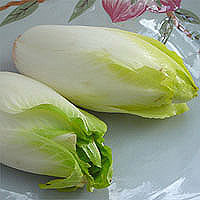
It's not really my intention to turn this into another food blog, but since so much of my mood depends on how I eat I felt this post would be an appropriate end to a very nice day.
This past weekend a small group of us were invited to D's house for a home-cooked meal before an evening of snooker (to be discussed in a future entry.) D owns a lovely home on the outskirts of Leuven with, among other things, a recently-remodeled, KILLER kitchen. Now, I've been doing my best in my little studio with two pots, two burners, one spatula, and a variety of generic dried spices to recreate the kind of meals I'm used to cooking at home with Z. But I must admit that one can only eat so many stir fries and pasta dishes before one gets, well, more than a little bored. So I was very pleased that, among other deliciously fatty dishes on the menu was included some wonderful endive stewed in a sweet cream sauce.
Endive, called "witloof" in Dutch, is a rather bitter root vegetable that is most often served in salads (leaves only), stewed, fried, or baked. Since the weekend I've had endive on the brain and so went to see what good ol' Chris Kimball and his staff at Cook's Illustrated had to offer in the way of innovative recipes. Number 1 on the list was an interesting-looking braised endive with apples. I thought this would be a good way to put a distinctly New England twist on a traditional Belgian vegetable, especially on a gray, rainy November day. So tonight I passed on stir fry and pasta in favor of a "real" meal!
I've pasted the recipe below. I did not follow the recipe exactly--Jonagold apples instead of Granny Smith and apple juice instead of cider--and I'm afraid the full range of flavors was a little muddled. But it was what I would call "mildly" successful, and I'll definitely try it again. My thanks to Chris Kimball who, I'm sure, was quite determined to "turn the usual mushy cooked endive into something even my old meat-and-potatoes neighbor up the hill would eat."
Cider-Braised Belgian Endive with Apples
To avoid discoloration, do not cut the endive far in advance of cooking. Delicate endive can fall apart easily if not handled gently. Move the halved endive in the pan by grasping the curved sides gingerly with tongs and supporting the cut sides with a spatula while lifting and turning. You will need a skillet with a tight-fitting lid for this recipe.
Serves 4
3 tablespoons unsalted butter
1/2 teaspoon granulated sugar
table salt
4 Belgian endive , medium sized (about 4 ounces each), wilted or bruised outer leaves discarded and each endive halved lengthwise
1 Granny Smith apple , peeled, cored, and cut into 1/4-inch-thick wedges
1/2 cup apple cider , plus 2 tablespoons
1/2 teaspoon minced fresh thyme leaves
1 tablespoon minced fresh parsley leaves
Ground black pepper
1. Heat 2 tablespoons butter in 12-inch heavy-bottomed skillet over medium-high heat; when foam subsides, sprinkle sugar and 1/4 teaspoon salt evenly over skillet and set endive (cut-sides down) and apples in a single layer. Cook, shaking skillet occasionally to prevent sticking and adjusting burner if browning too quickly, until golden brown, about 5 minutes. Turn endive and apples over and cook until curved sides are golden brown, about 3 minutes longer. Carefully turn endive cut-sides down. Add 1/2 cup of the cider, and thyme; reduce heat to low, cover skillet tightly, and simmer, checking occasionally and adding 2 tablespoons water if pan appears dry, until leaves open up slightly and endive and apples are tender throughout when pierced with tip of paring knife, 13 to 15 minutes. Transfer endive and apples to warmed serving platter; set aside.
2. Add remaining two tablespoons of cider to the skillet and increase heat to medium-high to bring liquid in skillet to boil; simmer until reduced to syrupy consistency, 1 to 2 minutes. Off heat, whisk in remaining tablespoon butter and parsley. Adjust seasoning with salt and pepper, spoon sauce over endive and apples, and serve immediately.
11 November 2006
Armistice Day
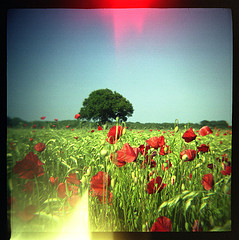
Today is Saturday, and, like most students, I have left a number of errands that should have been run during the week until today. Now, I've already learned the hard way that EVERYTHING in Belgium is closed on Sundays, and so anything that needs to get done needs to get done on Saturday. I must admit that my purchases for this week are rather negligible--shampoo, a box of cereal, a candle, a bottle of wine to take to a friend's for dinner--and aren't really life-threatening should they go unfinished. But, still, I think that I might be able to forge ahead more happily with my work (yes, for those of you who are losing faith in ever seeing a post about my research, I am hard at work!) if I have these little things taken care of. But this morning I stepped out the door and found out--again, the hard way--that everything is closed. No, I didn't sleep through two days. Today is Armistice Day.
Now, rather than complain about the fact that my hair and my breakfast will have to wait a couple of more days, I thought I would say a few brief words about Armistice Day in Belgium. World War I was devastating for much of Belgium. The country was a battleground for five straight years, and the people who couldn't escape faced starvation and disease. In fact, our own Herbert Hoover, before he became president, ran the Commission for Relief in Belgium (CRB) and was perhaps single-handedly responsible for saving the lives of millions of civilians. Today signs of Hoover's restoration is visible throughout the streets of Leuven: the Hooverplein, for example, sits next to KUL's Centrale Bibliotheek, rebuilt from utter ruin with funds provided by the CRB. The CRB was also responsible for establishing the prestigious Belgian American Education Foundation. And while most of WWI's veterans have passed away, many in Belgium's older generations still clearly remember the difficult times of WWI.
Now, having said this, I don't think I would have known it was Armistice Day if I hadn't attempted to run my errands. Aside from a note from our Fulbright Director in the monthly newsletter and the fact that there is a little more Vaughan Williams on the classical radio station today, I don't recall any mention of the Holiday. But this is, I think, the way of the Belgians: introverted and humble, even when it comes to such a meaningful celebration. So I am certainly happy to purchase my bottle of wine at the local convenience store if it means I am reminded of the day's importance to the people in my new home country.
10 November 2006
In Nederlands--deel een
Dit is mijn eerste post in Nederlands. Het is een beetje ruw maar wilt mijn lerares ons beoefenen.
Het is vandaag vrijdag, de tiende november. Het is een gewichtig dag omdat is vandaag mijn elfde verjaardag samen met mijn man Z. Op de tiende november negentienhonderd vijfennegentig (1995) gaan Z en ik aan ons eerste afspraakje. Wij zijn op "Lowry Dining Hall" gegaan. Blijde verjaardig Z!
Deze week zijn andere verjaardigen geweest. Op de achtste november zijn drie verjaardigen: mijn schoonbroer G, mijn andere schoonbroer J, en mijn vriend D. Het is een week druk!
Vandaag ga ik met mijn vriend A en haar schoonmoeder op lunch eten. Den studeer ik in the centrale bibliotheek. Vanavond zal ik thuisblijven.
Bedankt voor jouw geduld. :)
Het is vandaag vrijdag, de tiende november. Het is een gewichtig dag omdat is vandaag mijn elfde verjaardag samen met mijn man Z. Op de tiende november negentienhonderd vijfennegentig (1995) gaan Z en ik aan ons eerste afspraakje. Wij zijn op "Lowry Dining Hall" gegaan. Blijde verjaardig Z!
Deze week zijn andere verjaardigen geweest. Op de achtste november zijn drie verjaardigen: mijn schoonbroer G, mijn andere schoonbroer J, en mijn vriend D. Het is een week druk!
Vandaag ga ik met mijn vriend A en haar schoonmoeder op lunch eten. Den studeer ik in the centrale bibliotheek. Vanavond zal ik thuisblijven.
Bedankt voor jouw geduld. :)
08 November 2006
Mozart vs. Salieri
This year marks Mozart's 250th Birthday, and as a tribute to him musicians from all over the world have spent much of the year performing his music. This is, of course, just fine by me since I think that Mozart was an exceptional genius and just can't get enough of his music, especially when it is performed well. So I was very excited to find out that even polyphony-saturated Flemish musicians know how to lighten up and dance their way through a good classical fugue.
Sunday evening two local choirs combined efforts to present the Requiems of Salieri and Mozart, back to back, in concert at the St.-Jan-de-Doperkerk here in Leuven. Now, everyone has an idea of the rivalry that (perhaps) existed between these two Viennese-based composers, but though Mozart's music is immediately recognizably to most, Salieri is little performed today. And if you do want to give Salieri a fair shot, do NOT put him alongside Mozart in a concert, on your IPod, in your stereo, or even on your CD shelf. Salieri will not stand a chance.
Though I planned on going to the concert alone, I was lucky enough to run into my friend D at the entrance. D is one of a small group of us that drives up to Bruges every Monday night for choir rehearsal. As a Belgian native he has a passion for architecture and history, the perfect combination for an evening at one of Leuven's most interesting churches, especially when one has a 20-minute intermission and no chance whatsoever of using the church's one bathroom. As a tenor, D is also keenly interested in sharing opinions regarding music and musicians. We exchanged ideas regarding European and American choral performances, conducting technique, and various other nerdy topics. Our verdict of the evening was the same: despite Salieri's lackluster piece, the performance was magnificent (old instruments, original key, superb musicianship.) And having the opportunity to hear Mozart's Requiem, one of my all-time favorite pieces, in Europe is one I will not soon forget.
Sunday evening two local choirs combined efforts to present the Requiems of Salieri and Mozart, back to back, in concert at the St.-Jan-de-Doperkerk here in Leuven. Now, everyone has an idea of the rivalry that (perhaps) existed between these two Viennese-based composers, but though Mozart's music is immediately recognizably to most, Salieri is little performed today. And if you do want to give Salieri a fair shot, do NOT put him alongside Mozart in a concert, on your IPod, in your stereo, or even on your CD shelf. Salieri will not stand a chance.
Though I planned on going to the concert alone, I was lucky enough to run into my friend D at the entrance. D is one of a small group of us that drives up to Bruges every Monday night for choir rehearsal. As a Belgian native he has a passion for architecture and history, the perfect combination for an evening at one of Leuven's most interesting churches, especially when one has a 20-minute intermission and no chance whatsoever of using the church's one bathroom. As a tenor, D is also keenly interested in sharing opinions regarding music and musicians. We exchanged ideas regarding European and American choral performances, conducting technique, and various other nerdy topics. Our verdict of the evening was the same: despite Salieri's lackluster piece, the performance was magnificent (old instruments, original key, superb musicianship.) And having the opportunity to hear Mozart's Requiem, one of my all-time favorite pieces, in Europe is one I will not soon forget.
07 November 2006
A Morning in Mechelen
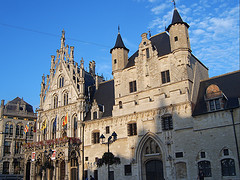
On Thursday I got a letter from the Belgian post office saying that if I didn't come to pick up my package they would send it back to the sender. Nevermind that this was the first notice I had received, I also had to go to Vilvoorde, a 45-minute train ride away, in order to get it. Now, I could probably start a separate blog and fill it with my copious complaints about the Belgian postal system! But I am learning to Belgian--patient, humble, inventive--and so I decided that I would make my visit to the completely-forgettable city of Vilvoorde more exciting by stopping off in Mechelen.
Halfway between Antwerp and Brussels, Mechelen (Malines in French) is a medieval city rich in musical history. And although one may never know it when stepping off the train today and walking straight into a row of seedy cafes (I am developing a discerning eye) and cheap clothing stores, but beyond Mechelen's suburban roads lies the well-maintained reminders of the city's rich past. In the late 15th-century Mechelen was chosen to be the home of the wealthy Burgundian court, and by 1500 the ruling ladies Margaret of York and her daughter-in-law Margaret of Austria had built up an impressive collection of music and musicians. Pierre de la Rue spent most of his working life here, and the famous printer Alamire had close ties with Mechelen. (There, after five-and-a-half blog entries I've included my first "academic adventure.") When the younger Margaret died in 1530, the Burgundian capital moved to Brussels, and Mechelen was never quite the same.
Walking through Mechelen's Grote Markt is like walking into an open-air museum. The Stadhuis (shown above) is an amazing example of unfinished architectural business. The original building, seen on the right, was severed in half by Margaret of Austria. She knocked down the part on the left and had it rebuilt in the more popular Gothic style (seen on the left.) I guess nobody thought much of her idea, because when she died the project was abandoned. Thus, what remains is one of Belgian's more striking buildings. St. Romboutskathedral is a similar hodge-podge of architectural design: the clean medieval lines of the interior is (in my opinion) marred by the tacky inclusion of Baroque statues and altars. The centerpiece of the St. R, however, is the wonderful square tower with its beautiful long and slender windows.
06 November 2006
Een "Klein" Wandeling: Autumn in the Ardennes
 A couple of weeks ago my friend J invited me to accompany him and some friends on a hike in the Ardennes. I had been getting a little stir-crazy and wondering when I might be able to experience Belgium's beautiful Southern mountains which are, for the most part, inaccessible by public transportation. So his invitation came at the right time, and for the next two weeks I whipped myself into shape. My last significant hike had been over two months ago on Mount Ranier, so I didn't want to embarrass myself. I hit the gym, I widened my stride on Leuven's cobble-stoned streets, I broke in my shoes with a long walk down to Zoet Water. Then earlier this past week J e-mailed with last-minute prep: we would drive down early in the AM, embark on our "little, hilly stroll through the woods," and meet up with another group later for dinner. I breathed a little sigh of relief. 32 kms, 5 mountain crossings, and 36 hours later, I am still recovering!
A couple of weeks ago my friend J invited me to accompany him and some friends on a hike in the Ardennes. I had been getting a little stir-crazy and wondering when I might be able to experience Belgium's beautiful Southern mountains which are, for the most part, inaccessible by public transportation. So his invitation came at the right time, and for the next two weeks I whipped myself into shape. My last significant hike had been over two months ago on Mount Ranier, so I didn't want to embarrass myself. I hit the gym, I widened my stride on Leuven's cobble-stoned streets, I broke in my shoes with a long walk down to Zoet Water. Then earlier this past week J e-mailed with last-minute prep: we would drive down early in the AM, embark on our "little, hilly stroll through the woods," and meet up with another group later for dinner. I breathed a little sigh of relief. 32 kms, 5 mountain crossings, and 36 hours later, I am still recovering!The Ardennes are a lovely, green spot in southern Belgium. It is as a region most famous among Americans for the role it played as a battleground in World War II. Unlike similar regions in the US, the Ardennes are not a nationally-protected area. So it is very often that its well-worn paths cut through small villages, down paved roads, and across private back yards. Our particular hike wound along the Semois River, a very picturesque region most famous for its beer breweries (both the villages of Orval and Ciney are here) and just a stones-throw from France. The mountains themselves are very old, and early on a misty, chilly November morning they created the perfect backdrop for a taste of "Old World" Belgium.
For me this was an opportunity to stray "off the beaten path" and see how the Walloons live. We passed an old tobacco farm that had been turned into a bed and breakfast. We encountered a large hunting party replete with baying dogs (many beagles!) At one point we began passing several signs saying things like "Keep Out! Hunting Season!" and "Do not enter--hunters ahead." What would most people do in such a situation? Turn around and take another path. What do the Belgians do? Break the rules, of course. J, who is a very funny guy with a particular fondness for Americans (he and his wife L spent three years in Boston), thought it might be a good idea to put me in the middle of the group. "If a hunter accidentally shoots an American, who knows what your American president will do!" There were laughs all around, which immediately ended at the close sound of rifle fire. Ah, Belgians. :)
And at the end of the day we stopped for local beers in a cozy pub, complete with roaring fire and filled to the brim with other Flemish hikers getting a taste of the mountains. We ended the evening with an excellent five-course meal and good conversation, most of which was in Flemish. Tired as I was, I was happy to sit and listen.
(A note on pics: I haven't been able to attach any of my own to my blog entries. Apparently the files are too big. If anyone has any thoughts as to how to reduce them please let me know!)
01 November 2006
Beer in Belgium
 Belgium is often described as the "culinary capital of Europe." Perhaps much to the chagrin of their French neighbors to the west, Belgians have rightfully taken this title to heart, producing some of the finest food in its many restaurants, cafes, and pubs. When I recently asked a friend to recommend a good lunch spot, his answer was that it was nearly impossible to make a bad choice. If a place is poor then it won't be open for long: Belgians have a very low tolerance for mediocrity when it comes to food.
Belgium is often described as the "culinary capital of Europe." Perhaps much to the chagrin of their French neighbors to the west, Belgians have rightfully taken this title to heart, producing some of the finest food in its many restaurants, cafes, and pubs. When I recently asked a friend to recommend a good lunch spot, his answer was that it was nearly impossible to make a bad choice. If a place is poor then it won't be open for long: Belgians have a very low tolerance for mediocrity when it comes to food.While I have been happily sampling the cafe culture in Leuven, I have been slow to truly experience the art of drinking Belgian beer. Perhaps a drink here or there with a meal (when the water and soda costs just as much as the beer on the lunch menu, then, well, why not?) but nothing too intense. So when a friend asked me to join her and her partner last night for "a drink," I didn't hesitate: absolutely!
Well, I should have known that Belgians don't go out for "a drink." And when one of the party is a British guy high off of Chelsea's recent football victory over Barcelona, then the drinks just keep on comin'. And I like to think that I have a pretty high tolerance, especially coming after a heavy meal of rice-vegetables-and-peanut-butter-in-a-pot surprise (don't laugh, it was actually very good!) Oh, how foolish I was. At 12:45 PM I am still padding slowly about my little studio, dressed in my flannels and wishing I had said "no" to that generously-offered fourth beer. I should have remembered Bill Bryson's experience drinking beer in Belgium. The good taste comes in part from a high alcohol content, a fact he leanred the hard way. If memory serves he was forced to attempt the pedestrian-swerve over uneven cobblestone streets on his way back to his dimly-lit hotel room which, of course, was on the top floor of an old, elevator-less building. My own post-drink experience was uncannily like his!
Bad decisions aside, I really enjoyed my sampling of beers last night. There is a great variety of Belgian beer. They are divided between blonds and darks, lagers and abbeys, heavily alcoholic and more-heavily alcoholic. They are often served in specific glasses which, according to my Belgian friend, are meant to reveal the unique attributes of each beer. According to her British boyfriend it really doesn't matter, they are all good and, hey, while we're at it, why can't they serve them in a heavy, thick, British-style pint glass and not these little 25 cl. servings? I may have been inclined to agree with him last night, but today I am happy that the Belgians are so thoughtful towards those of us less-informed about the strength of their beer: smaller, in this case, is definitely better.

